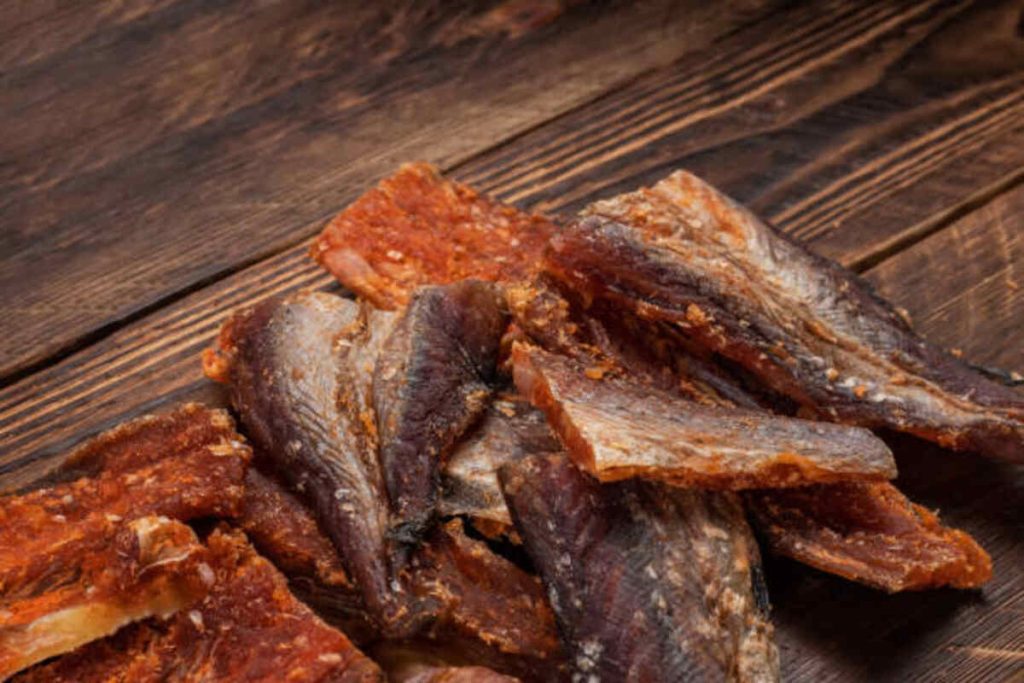Fish jerky can be an excellent alternative to red meat jerky as it contains less saturated fat while providing our bodies with Omega 3, B Vitamin, and antioxidants – and being eco-friendly! Fish jerky makes an ideal snack choice.
Camping trips or packing snacks without refrigeration are also ideal, and this snack box is an excellent addition.
Salmon
Salmon is an exceptionally nutritious fish, packed with Omega 3’s and other bioactive peptides to support joint cartilage health, insulin effectiveness, and digestion. Furthermore, it offers excellent sources of protein, which aid in muscle building, blood sugar regulation, and other benefits – it makes an incredibly delicious jerky snack option that adds earthy, savory flavor.
Jerky made from salmon is an ideal option for anyone who craves the flavor and texture of meat jerky but seeks healthier alternatives. Packed with protein and omega-3s while being relatively low in saturated fat content, salmon jerky provides ample potassium, magnesium, and selenium as well as an array of essential vitamins including A, B6, C & E for your body to benefit from!
Home-made salmon jerky can be easily made using any salmon, trout, or tuna species. Ensure any skin and bones have been removed before beginning. Slice your fish thinly (1/4″ slices are ideal) and marinate overnight in your favorite marinade (ideally overnight if possible for easier timing). After marinating, smoke it on a low setting (110F is ideal) for up to eight hours until a leathery and brittle texture has formed.
One ounce of salmon jerky contains up to six grams of protein, while leaner varieties can provide upwards of 12 grams per serving. Furthermore, its healthy polyunsaturated fats help lower cholesterol and inflammation levels while providing omega-3, essential for brain health and disease prevention.
Fish jerky may contain excessive sodium levels due to the salt used to preserve it, making it problematic for those trying to limit their sodium consumption. Furthermore, some varieties are high in added sugars, which could further complicate matters for those watching their sugar consumption. These issues can be avoided by making your salmon jerky with recipes calling for less salt or no added sugars at home.
Ahi
Ahi is one of the premier superfoods packed with protein that provides an instantaneous energy boost. Additionally, this superfood boasts zinc, iron, potassium selenium, and calcium as essential elements to health. Furthermore, Ahi contains omega-3 fatty acids known to lower heart disease risk.
Fish jerky has become increasingly popular as an environmentally-conscious consumer’s alternative to terrestrial livestock as an excellent source of animal protein, featuring lower levels of saturated fats and an abundance of omega-3 fatty acids – beneficial to heart and brain function. Fish jerky provides many vitamins and minerals such as iodine, magnesium, selenium, and phosphorus – it’s also an ideal source of animal protein as it leaves much smaller carbon footprints than terrestrial livestock.
As opposed to beef jerky, fish jerky contains 1.5 times more protein and offers excellent nutritional benefits. Furthermore, fish jerky is free from saturated fats and cholesterol found in red meat while being an excellent source of antioxidants, B vitamins, and essential minerals – making it a satisfying alternative.
Tuna jerky is an increasingly popular gourmet snack, making it an ideal healthy beef jerky alternative. Flavored according to personal taste and more straightforward than its red meat counterpart, tuna jerky can be made using sushi-grade tuna and other types of fish, such as salmon or trout.
Tuna
Fish jerky offers protein with less fat than its beef counterpart and is an ideal option for camping trips or overnight journeys with no refrigeration available. Choose your desired marinade and customize a recipe just right for yourself!
Fish jerky can be an ideal alternative to red meat for people trying to reduce saturated fats and cholesterol intake. Fish jerky provides high levels of protein, omega-3 fatty acids, and other essential nutrients. Furthermore, its saturated fat levels are lower, making it an excellent source of Vitamin D and helping with calcium absorption while decreasing inflammation – all excellent choices when cutting back on saturated fats and cholesterol intake.
To create fish jerky, start by washing and patting dry the tuna, placing it into a glass mixing bowl with your chosen marinade, and allowing it to marinate for 4-8 hours. After the tuna slices have been marinated in their selected recipe, place them onto a dehydrator sheet in an oven set between 110-145 degrees Fahrenheit to dry for several hours, checking frequently until its leathery texture appears and it cracks when bent slightly. Jerky will be ready when its slices have soft, chewy textures when bent slightly!

